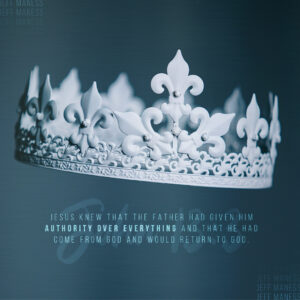 Do you know who you are? Not like your name. If you don’t know your name, please call emergency services right now because you have more significant issues than this devotional thought. What I mean is, do you know who you REALLY are?
Do you know who you are? Not like your name. If you don’t know your name, please call emergency services right now because you have more significant issues than this devotional thought. What I mean is, do you know who you REALLY are?
When you know who you are and who you belong to, it will change what you choose to do. Or at least it should.
In John Chapter 13, Jesus was nearing the end of his earthly life. He was meeting with His disciples for the last time before being brutally beaten and killed for the world’s sins. In Christianity, we call this the Last Supper.
When you know who you are and who you belong to, it will change what you choose to do. Share on X
John’s Gospel records the most lengthy description of this final meal with the disciples. Chapters 13-17 record details from their supper together, but also a lengthy discourse regarding Christ’s departure from the earth. While at this meal, look at what John records.
John 13:3-5 Jesus knew that the Father had given him authority over everything and that he had come from God and would return to God. So he got up from the table, took off his robe, wrapped a towel around his waist, and poured water into a basin. Then he began to wash the disciples’ feet, drying them with the towel he had around him.
Don’t miss the significance of this. Jesus knew who He was, where He came from, and where He was going. This empowered Him to do what He needed to do. And what was it that He did?
Let’s go back to the Scripture for a moment. It says, “Jesus knew that the Father had given him authority over everything and that he had come from God and would return to God. So…”
If you take our faith out of it and look at this purely from a human perspective, what would you think comes next? If someone had authority over everything, knew that they came from God and would return to God, you’d think the next statement would be: So, He demanded that all people everywhere bow down to Him. Or, He eliminated His accusers one by one. Or at the very least, He made the disciples wash His feet. But that’s not what He did.
Jesus knew that the Father had given Him authority over everything and that He had come from God and would return to God. So, He got up from the table, took off His robe, wrapped a towel around His waist, and poured water into a basin. Then He began to wash the disciples’ feet. Let that sink in.
Jesus, God in the flesh, didn’t use His authority or position for His own gain, but for the good and gain of others. Philippians Chapter 2 tells us that even though Jesus “was God, He did not think of equality with God as something to cling to. Instead, He gave up His divine privileges; He took the humble position of a slave and was born as a human being.”
He was God, and He chose to serve. I am definitely not God, yet how often do I seek to be served? How often to I make my life and leadership about how it benefits me? Ask yourself those difficult questions as well.
When we truly understand who we are, undeserving sinners saved by the grace of God. When we truly understand Who we belong to, the ever-loving, always gracious, radically generous God of the universe. When we truly understand where we are going, being with Him one day for eternity. When we know all that, it should change what we choose to do and how we choose to live. Or at least it should.
Our position in Christ should determine our practice in life. Share on XOur position in Christ should determine our practice in life. And the practice of Jesus was one of serving, sacrifice, and generosity. He never made life about Him. Can I say that about myself?
